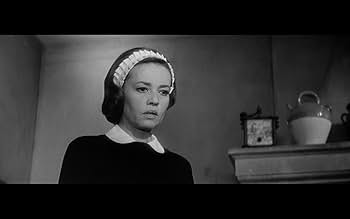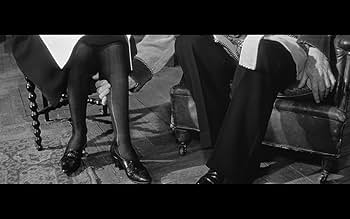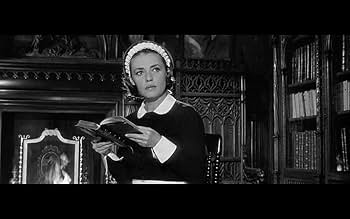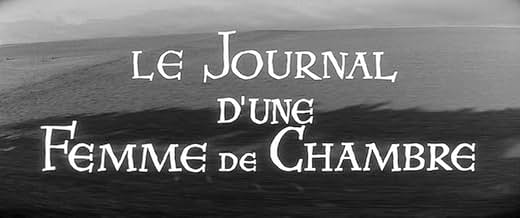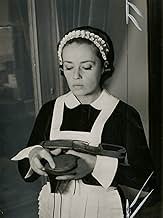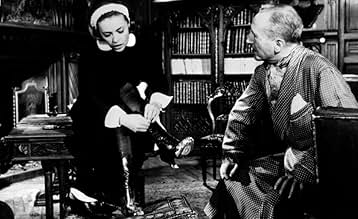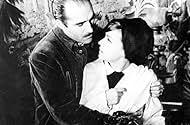VALUTAZIONE IMDb
7,4/10
10.190
LA TUA VALUTAZIONE
Una donna sofistica di Parigi entra in una casa rurale di classe media come cameriera e provoca un bel casino tra i vari perversi e violenti abitanti.Una donna sofistica di Parigi entra in una casa rurale di classe media come cameriera e provoca un bel casino tra i vari perversi e violenti abitanti.Una donna sofistica di Parigi entra in una casa rurale di classe media come cameriera e provoca un bel casino tra i vari perversi e violenti abitanti.
- Regia
- Sceneggiatura
- Star
- Premi
- 1 vittoria e 2 candidature totali
Recensioni in evidenza
Luis Buñuel, the man considered Spain's finest filmmaker and revered master of surrealism by both critics and film historians, made a surprising change of style in the first of the series of masterpiece she did in France during his last years. Taking out his usual surrealist set-pieces, he adapts Octave Mirbeau's revered novel about social classes in a very straight-forward fashion. However, this does not mean the movie is bad as many may believe; quite the opposite, "Le Journal d'eune Femme de Chambre" is a perfect showcase of Buñuel's finest film-making style, ambiguous and stylish, like the master's own vision of life.
The plot follows Celestine (Jeanne Moreau), an urban young woman moving to country in 30s France to work as a chambermaid for the Monteils, a rich family with a few dark secrets. As soon as she arrives, problems start as she tries to adapt to her new life with the bizarre Monteils. Between the constant advances of sexually insatiable Monsieur Monteil (Michel Piccoli), the always vigilant eye of his materialist wife (Françoise Lugagne) and the shoe fetish of old Monsieur Rabour (Jean Ozenne); Celestine makes her way through this collection of living portraits of the most bizarre human nature.
With a plot like this it would easy to believe this is a movie where the high class is demonized and the poor sanctified, but this is not the case here. Buñuel makes sure to have an ambiguity in every character, even in Celestine herself. There is no black and white, just different shades of gray, in a way similar to the beautiful black & white photography he uses here.
The photography is essential in this film; not only for aesthetic purposes, it represents the dark decadent days of 30s Europe, and the pessimism latent in both rich and poor people. As I wrote above, the shades of gray match perfectly the ambiguity of a group of characters with as many virtues as flaws. Buñuel and his cast manage to create believable and realistic characters.
Jeanne Moreau gives a brilliant performance as Celestine. As the beautiful young city woman highly intelligent and not without aspirations, her character has enough room to let her shine, and she really makes the most of it. Equally brilliant is Georges Géret as Joseph, the tough gardener with fascist ideals that has a secret agenda. The rest of the cast is also very good and together with the witty script complete a superb character-driven movie.
Buñuel's masterful direction creates a film that, while completely focused on the characters, is still filled with his usual symbolism. The edition and the camera-work are superb and way the camera seems to flow inside the house gives the film a voyeuristic feeling. No wonder why Buñuel consider it a very erotic film.
While many people consider this movie as one of his "lesser works", I consider it to be quite underrated, as it proved that Buñuel was a master not only of surrealism, but of film-making in general. 9/10
The plot follows Celestine (Jeanne Moreau), an urban young woman moving to country in 30s France to work as a chambermaid for the Monteils, a rich family with a few dark secrets. As soon as she arrives, problems start as she tries to adapt to her new life with the bizarre Monteils. Between the constant advances of sexually insatiable Monsieur Monteil (Michel Piccoli), the always vigilant eye of his materialist wife (Françoise Lugagne) and the shoe fetish of old Monsieur Rabour (Jean Ozenne); Celestine makes her way through this collection of living portraits of the most bizarre human nature.
With a plot like this it would easy to believe this is a movie where the high class is demonized and the poor sanctified, but this is not the case here. Buñuel makes sure to have an ambiguity in every character, even in Celestine herself. There is no black and white, just different shades of gray, in a way similar to the beautiful black & white photography he uses here.
The photography is essential in this film; not only for aesthetic purposes, it represents the dark decadent days of 30s Europe, and the pessimism latent in both rich and poor people. As I wrote above, the shades of gray match perfectly the ambiguity of a group of characters with as many virtues as flaws. Buñuel and his cast manage to create believable and realistic characters.
Jeanne Moreau gives a brilliant performance as Celestine. As the beautiful young city woman highly intelligent and not without aspirations, her character has enough room to let her shine, and she really makes the most of it. Equally brilliant is Georges Géret as Joseph, the tough gardener with fascist ideals that has a secret agenda. The rest of the cast is also very good and together with the witty script complete a superb character-driven movie.
Buñuel's masterful direction creates a film that, while completely focused on the characters, is still filled with his usual symbolism. The edition and the camera-work are superb and way the camera seems to flow inside the house gives the film a voyeuristic feeling. No wonder why Buñuel consider it a very erotic film.
While many people consider this movie as one of his "lesser works", I consider it to be quite underrated, as it proved that Buñuel was a master not only of surrealism, but of film-making in general. 9/10
This is the most straight-forward film I've seen by the surrealist master Bunuel, and despite its cryptic turn in the final moments, is funny, chilling, and a bit nasty. The story follows an urbane chambermaid from Paris who comes to work at the country estate of a repressed bourgeosie family. She weathers passes from every man in sight and deflects them, but for morally ambiguous reasons. Moral ambiguity is rampant, as it is so often in Bunuel's films, and spread liberally amongst all classes. It's subtly a film about selling out, except that nobody seemed to have any principles to begin with. Good fun. Now tell me what the ending was all about.
A young woman reports to work as a chambermaid at the residence of an eccentric family in the French countryside. Moreau is fine as the maid, a strong-willed woman who attracts the attention of practically every man in the household and neighborhood. Geret as a servant and Piccoli as the testosterone-laden man of the house also turn in notable performances. In one of his more accessible films, Bunuel creates some beautiful imagery with his wide-screen black and white cinematography. However, the script is uneven, with the plot point concerning the rape and murder of a child mixing uneasily with the political and comedic elements. The conclusion is abrupt and unsatisfying.
This is my favorite Buñel film. The story is stunningly presented, an absolute work of art, unbelievably subtle but always concrete. It is like a great symphony: every note is perfect.
Surprisingly (considering the title) Le journal d'une femme de chambre is not about sex, nor is it a journal for that matter. It is about politics, sexual politics of course, but also domestic politics, manor politics, and nation-state politics. The time is the thirties as fascism moves toward its mesmerizing stranglehold on a decadent Europe. The place is France (Normandy, I imagine) where the republicans hold power. In the streets are those who would be brown suits and among them is Joseph (Georges Geret), groundskeeper for a petite bourgeois family of degenerate eccentrics. He is an incipient Nazi, a xenophobic anti-Semitic man who worships brute force, an ignorant man that every French movie-goer knows will be a Nazi-collaborator once France is under the occupation.
The story is seen from the point of view of Celestine, a chambermaid of some sophistication (and an abiding, but understandable duplicity), a Parisian who has come to work for the family in the country. She is played by the incomparable Jeanne Moreau of the plastic face, a woman of many guises, many moods and an ability to depict with a glance any emotion. She is a great star of the French stage and screen who plays the part effortlessly, with finesse and a fine subtlety. The screenplay by Buñel and the brilliant Jean-Claude Carriere (who penned so many outstanding films, Bell de Jour (1967), The Discreet Charm of the Bourgeoisie (1972), Valmont (1989), The Ogre (1996), etc.) is an adaptation of the novel by Octave Mirbeau. There is a Hollywood film of the same name starring Paulette Goddard, Burgess Meredith and Judith Anderson, directed by Jean Renoir that I haven't seen, released in 1946. I understand the treatment was more comedic and conventional.
Surrealist Luis Buñel's film is perhaps best described as a comédie noire, a genre antecedent to the familiar (and somewhat similar) film noir. In the latter the comedy is usually incidental and there is no attempt at any great philosophic or symbolic significance. Here Buñel not only makes a statement about the nature of the relationship between bourgeois Europe in the thirties and fascism, but even delves into the primeval nature of women and gives us a sharp look at a woman's place in bourgeois society. Celestine is duplicitous because she has to be to survive. She uses men the way the society uses her.
Be sure and pay close attention to the final scene inside and outside the café and consider the implications of what is being shown. What is being suggested? Will Joseph finally get the punishment he so richly deserves? Or did Celestine make the choice she made out of fear? Is the union between Joseph and Celestine symbolic of that between the fascists and Europe?
For those interested in this last theme I highly recommend Vittoria De Sica's brilliant The Garden of the Finzi-Continis (1971).
(Note: Over 500 of my movie reviews are now available in my book "Cut to the Chaise Lounge or I Can't Believe I Swallowed the Remote!" Get it at Amazon!)
Surprisingly (considering the title) Le journal d'une femme de chambre is not about sex, nor is it a journal for that matter. It is about politics, sexual politics of course, but also domestic politics, manor politics, and nation-state politics. The time is the thirties as fascism moves toward its mesmerizing stranglehold on a decadent Europe. The place is France (Normandy, I imagine) where the republicans hold power. In the streets are those who would be brown suits and among them is Joseph (Georges Geret), groundskeeper for a petite bourgeois family of degenerate eccentrics. He is an incipient Nazi, a xenophobic anti-Semitic man who worships brute force, an ignorant man that every French movie-goer knows will be a Nazi-collaborator once France is under the occupation.
The story is seen from the point of view of Celestine, a chambermaid of some sophistication (and an abiding, but understandable duplicity), a Parisian who has come to work for the family in the country. She is played by the incomparable Jeanne Moreau of the plastic face, a woman of many guises, many moods and an ability to depict with a glance any emotion. She is a great star of the French stage and screen who plays the part effortlessly, with finesse and a fine subtlety. The screenplay by Buñel and the brilliant Jean-Claude Carriere (who penned so many outstanding films, Bell de Jour (1967), The Discreet Charm of the Bourgeoisie (1972), Valmont (1989), The Ogre (1996), etc.) is an adaptation of the novel by Octave Mirbeau. There is a Hollywood film of the same name starring Paulette Goddard, Burgess Meredith and Judith Anderson, directed by Jean Renoir that I haven't seen, released in 1946. I understand the treatment was more comedic and conventional.
Surrealist Luis Buñel's film is perhaps best described as a comédie noire, a genre antecedent to the familiar (and somewhat similar) film noir. In the latter the comedy is usually incidental and there is no attempt at any great philosophic or symbolic significance. Here Buñel not only makes a statement about the nature of the relationship between bourgeois Europe in the thirties and fascism, but even delves into the primeval nature of women and gives us a sharp look at a woman's place in bourgeois society. Celestine is duplicitous because she has to be to survive. She uses men the way the society uses her.
Be sure and pay close attention to the final scene inside and outside the café and consider the implications of what is being shown. What is being suggested? Will Joseph finally get the punishment he so richly deserves? Or did Celestine make the choice she made out of fear? Is the union between Joseph and Celestine symbolic of that between the fascists and Europe?
For those interested in this last theme I highly recommend Vittoria De Sica's brilliant The Garden of the Finzi-Continis (1971).
(Note: Over 500 of my movie reviews are now available in my book "Cut to the Chaise Lounge or I Can't Believe I Swallowed the Remote!" Get it at Amazon!)
This is only my second Bunel film (The Discreet Charm of the Bourgeoisie), and I am fascinated with the way he portrays the upper crust. here we have an odd family with some strange habits. Didn't you always think they were like that. It's the old joke about how you can determine class bu how two couples sit in a car. Lower class - men in front and women in the back; middle class husbands and wives sit together; upper class husbands sit with the other's wife.
Show fetishes, randy husbands, cold wives, rape and murder are all here amidst a fascist France. They are always going on about the republicans, ours would fit right in with the anti-semitism and xenophobia.
Among all this is the classic acting of Jeanne Moreau, a classy chambermaid, who is even willing to marry a fascist to prove him guilty of murder and rape. In the end, she turns out to be just an opportunist.
It would probably be more enjoyable knowing more about 1930s France, but it was still a classic.
Show fetishes, randy husbands, cold wives, rape and murder are all here amidst a fascist France. They are always going on about the republicans, ours would fit right in with the anti-semitism and xenophobia.
Among all this is the classic acting of Jeanne Moreau, a classy chambermaid, who is even willing to marry a fascist to prove him guilty of murder and rape. In the end, she turns out to be just an opportunist.
It would probably be more enjoyable knowing more about 1930s France, but it was still a classic.
Lo sapevi?
- QuizThis is Luis Buñuel's only film in the anamorphic widescreen format.
- BlooperAt the train station, Célestine is supposed to be returning to Paris but she's waiting on the wrong side of the tracks: In one shot, one can clearly read "Direction Paris" on the other side.
- ConnessioniFeatured in A propósito de Buñuel (2000)
I più visti
Accedi per valutare e creare un elenco di titoli salvati per ottenere consigli personalizzati
- How long is Diary of a Chambermaid?Powered by Alexa
Dettagli
Botteghino
- Lordo in tutto il mondo
- 126 USD
- Tempo di esecuzione
- 1h 37min(97 min)
- Colore
- Mix di suoni
- Proporzioni
- 2.35 : 1
Contribuisci a questa pagina
Suggerisci una modifica o aggiungi i contenuti mancanti

